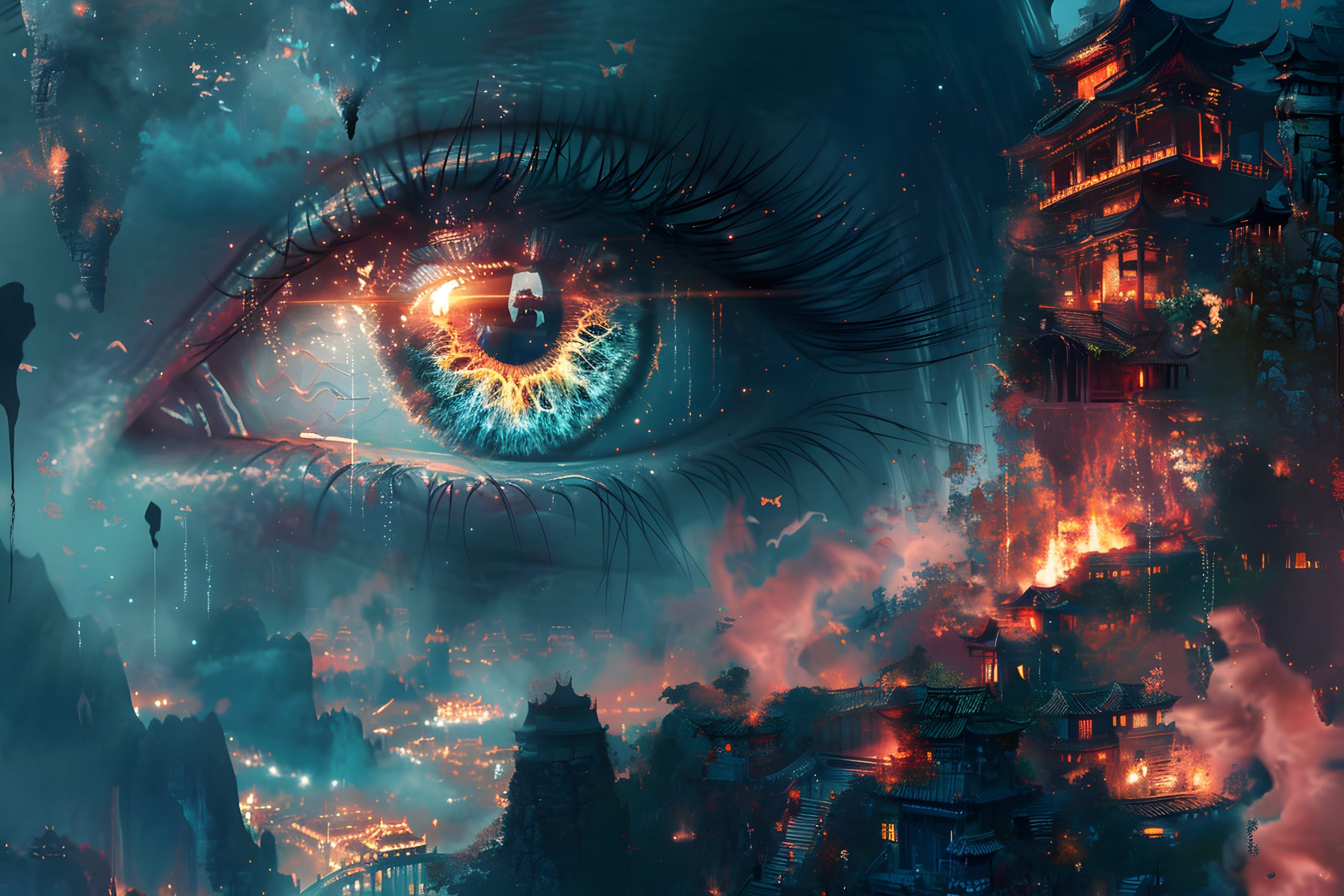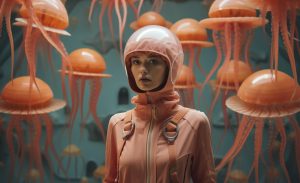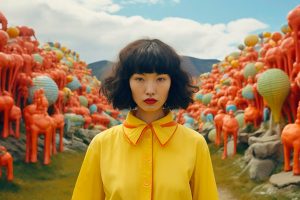Art /Entertainment
AI-Generated Art in Movie Posters: Creative or Controversial?

Introduction
Artificial Intelligence (AI) has been making waves across various industries, from healthcare to finance, and now it is increasingly infiltrating the creative realms of art and design. One area where AI’s influence is becoming particularly noticeable is in the creation of movie posters. These AI-generated movie posters are raising eyebrows, sparking debates, and prompting us to re-evaluate our understanding of creativity and artistic value. This article delves into the rise of AI-generated movie posters, examining their creative potential and the controversies they ignite.
The Rise of AI in Art and Design

Image by freepik
AI’s journey into the world of art and design is not a sudden leap but a gradual evolution. Initially, AI was used for tasks like image recognition and enhancement. However, with advancements in machine learning and neural networks, AI’s capabilities have expanded to include the creation of original artwork. AI-generated art has been showcased in galleries, sold at auctions, and even used in advertising. The film industry, always on the lookout for innovative ways to capture audience attention, has begun to explore AI-generated movie posters as a novel approach to marketing.
How AI-Generated Movie Posters are Created

Image by freepik
The process of creating AI-generated movie posters involves several steps and the use of sophisticated algorithms. Here’s a simplified breakdown:
- Data Collection: AI algorithms require a large dataset to learn from. This dataset usually consists of thousands of existing movie posters, covering various genres, styles, and time periods.
- Training the Model: The AI model is trained using the collected data. During this phase, the AI learns to recognize patterns, styles, and elements that make a movie poster effective and visually appealing.
- Generating Posters: Once trained, the AI can generate new movie posters based on specific inputs. These inputs could include the movie’s genre, plot summary, key themes, and even specific visual elements requested by the designers.
- Refinement: The generated posters are then reviewed and refined by human designers to ensure they meet the desired standards and effectively convey the movie’s essence.
Creative Potential of AI-Generated Movie Posters

Image by freepik
AI-generated movie posters offer several creative advantages:
- Innovation: AI can generate unique and innovative designs that might not occur to human designers. This can result in fresh and eye-catching posters that stand out in a crowded market.
- Efficiency: AI can produce multiple design options in a fraction of the time it would take a human designer. This allows for a quicker turnaround and more experimentation with different styles and concepts.
- Personalization: AI can tailor posters to specific audiences by analyzing demographic data and preferences. This means that different versions of a poster can be created to appeal to various target groups, enhancing marketing effectiveness.
- Cost-Effectiveness: While the initial investment in AI technology can be high, the long-term cost savings can be significant. AI can reduce the need for extensive human labor, lowering overall production costs.
Controversies Surrounding AI-Generated Movie Posters

Image by freepik
Despite the creative potential, AI-generated movie posters are not without controversy. Several issues have sparked debate within the industry and among the public:
- Authenticity and Artistic Value: One of the main criticisms is that AI-generated art lacks the authenticity and emotional depth of human-created art. Critics argue that true creativity involves human experience, emotion, and intuition, which AI cannot replicate.
- Job Displacement: The rise of AI in creative fields raises concerns about job displacement for human designers. As AI becomes more capable, there is a fear that it could replace human jobs, leading to unemployment and a devaluation of human creativity.
- Ethical Considerations: The use of AI in art raises ethical questions about authorship and intellectual property. Who owns the rights to an AI-generated poster? Is it the company that owns the AI, the designers who input the data, or the AI itself? These questions remain largely unresolved.
- Quality Control: While AI can generate impressive designs, it is not infallible. There is a risk of producing subpar or inappropriate content, which could harm a movie’s marketing campaign. Human oversight is essential to ensure quality and appropriateness.
The Future of AI-Generated Movie Posters

Image by freepik
The future of AI-generated movie posters is likely to be a blend of human and artificial intelligence. AI can serve as a powerful tool to augment human creativity, providing new ideas and speeding up the design process. However, the human touch will remain crucial in refining and perfecting the final product.
As AI technology continues to evolve, we can expect to see more sophisticated and nuanced AI-generated art. The key will be finding a balance that leverages AI’s strengths while preserving the unique qualities of human creativity.
Analysis Table: Pros and Cons of AI-Generated Movie Posters
| Advantages | Disadvantages |
| Speed and efficiency | Potential loss of human creativity |
| Cost-effective solutions | Risk of job displacement in creative industries |
| Enables creative experimentation | Possibility of homogenization in design |
| Allows rapid iteration of designs | Ethical concerns around intellectual property |
| Can complement human design efforts | Lack of emotional depth in fully AI-generated work |
Comparative Table: AI vs. Human-Generated Movie Posters
| Factor | AI-Generated Posters | Human-Generated Posters |
| Speed | Instant or rapid creation | Time-consuming, multiple drafts |
| Cost | Low cost, minimal labor | Higher cost due to human effort |
| Creativity | Pattern-based, experimental designs | Unique, emotionally resonant interpretations |
| Originality | May mimic existing trends | High level of originality and nuance |
| Job Impact | Reduces need for human designers | Supports employment for artists |
Conclusion
AI-generated movie posters represent a fascinating intersection of technology and art. They offer exciting possibilities for innovation and efficiency but also raise important questions about authenticity, employment, and ethics. As the film industry continues to explore this new frontier, the debate over whether AI-generated posters are creative or controversial is likely to persist. Ultimately, the integration of AI into the creative process will require careful consideration and a thoughtful approach to ensure that it enhances rather than diminishes the art of movie poster design.
Art /Entertainment
Homestays in Kasaragod: Backwaters, Beaches, and Tranquility

Introduction
If you are looking for a calm and refreshing escape in northern Kerala, choosing a homestay in Kasaragod is one of the best ways to experience true serenity. Kasaragod is famous for its pristine beaches, picturesque backwaters, undulating hills, and serene village life. Unlike more commercial tourist hubs, this district offers a slower pace, making it perfect for travelers who value privacy, nature, and authentic hospitality.
A homestay allows you to experience Kerala beyond sightseeing. You wake up to fresh air, enjoy home-cooked meals, and connect with local families who warmly welcome guests into their homes. The peaceful environment, combined with genuine hospitality, creates a memorable stay.
Why Kasaragod Is Ideal for a Peaceful Stay
Kasaragod blends coastal charm with rural beauty. Attractions such as Bekal Fort, Valiyaparamba Backwaters, and Ranipuram Hills add to the district’s appeal. However, what truly makes Kasaragod special is its calm atmosphere. The beaches are less crowded, the countryside remains green and open, and traditional homes maintain their heritage character.
Most homestays are located in serene setting near beaches, backwaters, or plantations offering guests quiet mornings and relaxing evenings. The absence of heavy commercialization ensures a tranquil experience.

Best Homestays in Kasaragod for a Relaxing Experience
When searching for the best homestays in Kasaragod, consider properties that focus on natural surroundings, personal care, and traditional architecture. Here are the types of homestays that offer a peaceful Kerala stay:
1. Backwater Homestays
Homestays near Valiyaparamba Backwaters provide calm water views and a soothing atmosphere. Guests can enjoy canoe rides, sunset views, and fresh seafood prepared in traditional Kerala style. The quiet surroundings make these stays ideal for couples and nature lovers.
2. Beachside Homestays Near Bekal
Beachside homestays near Bekal offer easy access to quiet shorelines without the rush of large resorts. Morning walks along the beach and evening views of the sea create a deeply relaxing experience. These homestays often provide spacious rooms and open verandas where guests can unwind.
3. Plantation and Countryside Homestays
For those who prefer greenery, plantation homestays in areas like Nileshwar and Badiadka offer a refreshing escape. Enclosed by coconut palms, areca nut plantations, and rice paddies, these residences enable visitors to reconnect with the natural world. Some hosts even introduce visitors to farming activities and local village life.
What Makes Homestays in Kasaragod So Peaceful?
Personalized Hospitality
Hosts treat guests like family rather than customers. This personal attention ensures comfort and creates a welcoming environment.
Authentic Kerala Cuisine
Most homestays serve freshly prepared meals made from local ingredients. Traditional dishes such as appam, fish curry, puttu, and vegetable curries are often part of the experience.
Natural Surroundings
Whether near hills, backwaters, or beaches, homestays in Kasaragod are usually surrounded by greenery and open spaces. The quiet rural setting enhances relaxation.
Less Crowd and Noise
Kasaragod remains relatively untouched compared to major tourist centers. This means fewer crowds, less traffic, and more privacy.
Activities to Enjoy During Your Stay
A peaceful stay does not mean limited activities. You can explore historic forts, take boat rides in the backwaters, trek in the hills, or simply relax in a garden with a book. Village walks and interactions with locals offer insight into Kerala’s traditions and lifestyle.
If you prefer a slow holiday, you can spend your time enjoying sunsets, tasting local cuisine, and appreciating the natural surroundings.
Best Time to Visit
The ideal time to visit Kasaragod is between October and March when the weather is pleasant and comfortable. Monsoon season also brings lush greenery and fewer tourists, making it suitable for those seeking extra solitude.
Tips for Choosing the Right Homestay
- Select a location based on your preference—beach, backwater, or countryside.
- Read guest reviews to understand service quality.
- Confirm meal arrangements and amenities.
- Check accessibility and transport options if the property is remote.
Clear communication with your host ensures a smooth and satisfying stay.
Frequently Asked Questions (FAQ)
1. What makes homestays in Kasaragod different from hotels?
Homestays in Kasaragod offer a more personal and culturally immersive experience compared to hotels. Guests stay with local families, enjoy home-cooked meals, and experience daily life in a traditional Kerala setting.
2. Are homestays in Kasaragod suitable for families?
Yes, homestays in Kasaragod are ideal for families. Many properties offer spacious rooms, safe surroundings, and a peaceful environment perfect for children and elders.
3. Do homestays in Kasaragod provide meals?
Most homestays in Kasaragod provide traditional Kerala meals, either included in the package or available on request. It is always recommended to confirm meal options while booking.
4. Are homestays in Kasaragod safe for solo travelers?
Yes, homestays in Kasaragod are generally safe for solo travelers. Hosts maintain a secure and welcoming atmosphere, making guests feel comfortable and cared for.
5. What is the average cost of homestays in Kasaragod?
The price of homestays in Kasaragod varies depending on location, amenities, and season. However, they are usually affordable compared to resorts and hotels, offering good value for money.
Art /Entertainment
Coral Drive Villas Chennai: Beachfront Luxury on ECR

Finding the perfect beach getaway can feel overwhelming. However, Coral Drive Villas on East Coast Road (ECR), Chennai, makes that choice simple. This private collection of beach house villas offers a peaceful and luxurious stay close to the sea. Guests enjoy comfort, privacy, and direct beach access, all in one place.
Coral Drive launched in 2021 and quickly gained attention from travelers. Since then, it has welcomed guests from different backgrounds. Many visitors return because they love the calm atmosphere and premium experience. Whether you want a relaxing weekend or a lively gathering, Coral Drive offers something for everyone.
Sea Breeze Villa: Where Luxury Meets the Ocean
Sea Breeze stands out as one of the most premium villas at Coral Drive. It sits along ECR, about 10 kilometers before Mahabalipuram. This location offers stunning ocean views while keeping you away from city noise. As a result, guests enjoy both beauty and peace.
The villa features a wide panoramic view of the sea. You can also spot scattered rocks along the shoreline, which add to the natural charm. At the same time, the property remains private and quiet. This balance creates the perfect setting for relaxation.
Sea Breeze works well for many occasions. You can plan a family trip, a small gathering, or even a corporate meet-up. The villa accommodates up to 12 guests comfortably. It includes three spacious bedrooms, and each room offers a beautiful pool or sea view.
The design of the villa enhances the overall experience. A large swimming pool becomes the highlight of the space. Inside the pool, you will find a wooden swing that adds a unique touch. Many guests love this feature because it looks great in photos. In addition, the villa includes several cozy corners that feel perfect for relaxing or capturing memories.
Inside, the villa provides all essential amenities. You get a TV, secure parking, and a modular kitchen. The living room feels spacious and welcoming, which makes it ideal for group stays.
The terrace garden adds even more value. It offers a breathtaking view of the ocean. Guests often use this space for private parties and celebrations. The terrace can host around 20 to 35 people, which makes it perfect for birthdays, small events, or casual gatherings.

BareFoot Bay I: Comfort with Direct Beach Access
BareFoot Bay I offers a cozy and fully furnished beach villa experience. It provides direct access to the beach, which makes it ideal for travelers who love the sea.
The villa includes two bedrooms and two bathrooms. It also features a comfortable living area and a fully equipped kitchen. In addition, guests can enjoy a private balcony and terrace.
The location feels calm and pleasant. You can relax without distractions, yet still enjoy modern comforts. Each bedroom includes air conditioning, which ensures a comfortable stay in all seasons. A Smart TV with DTH keeps you entertained during your downtime.
The interiors feel bright and cheerful. This design creates a welcoming atmosphere for guests. At the same time, private parking adds convenience. Overall, BareFoot Bay I combines simplicity with comfort, making it a great choice for small families or groups.
BareFoot Bay II: Private Pool and Modern Living
BareFoot Bay II offers a more upgraded experience with a private swimming pool. This villa suits guests who want both luxury and privacy.
The property includes two bedrooms and two bathrooms. It also features a spacious living room and a fully equipped kitchen. Guests can relax on the private terrace or enjoy the balcony view.
This villa works well for couples, families, or friends. Its beachside location allows easy access to the shore. At the same time, the private pool adds an exclusive touch to your stay.
The villa includes air conditioning and a Smart TV for entertainment. The kitchen comes with all necessary equipment, which allows guests to cook their own meals. In addition, secure parking ensures a hassle-free experience.
BareFoot Bay II creates the perfect environment to relax and connect with nature. It blends comfort, style, and convenience in one space.
BareFoot Bay III: A Premium Coastal Retreat
BareFoot Bay III takes the experience to the next level. This villa combines elegance, privacy, and modern design. Guests enjoy access to a private beach as well as a shared swimming pool.
The villa includes two bedrooms, two bathrooms, and a spacious living area. It also features a well-equipped kitchen, a private terrace, and a balcony. Every detail focuses on comfort and functionality.
The location enhances the overall experience. Situated in a gated community on ECR, the villa offers both safety and exclusivity. At the same time, it remains close to popular spots like the Crocodile Park and Park Grand Sheraton.
This villa suits both short stays and longer vacations. Guests can relax, unwind, and enjoy the beauty of the coastline. Whether you travel as a couple or with family, BareFoot Bay III offers a memorable stay.
Why Choose Coral Drive Villas?
Coral Drive Villas stand out for many reasons. First, they offer direct beach access, which enhances your experience. Second, each villa provides privacy and comfort. Third, the design focuses on both style and practicality.
In addition, these villas suit different needs. You can plan a weekend escape, a celebration, or even a work retreat. The flexible spaces allow you to create your own experience.
Moreover, the villas include modern amenities. Guests enjoy clean spaces, secure parking, and fully equipped kitchens. These features make every stay smooth and convenient.
Important Guidelines for Guests
To ensure a pleasant stay, guests should follow a few simple rules. Check-in starts at 1 PM, while check-out ends at 11 AM. The team prepares each villa carefully before arrival, so timing matters.
Guests should avoid smoking or drinking inside rooms. However, they can enjoy these activities in designated outdoor areas. The private beach remains accessible from 5 AM to 10 PM.
Pool access varies depending on the day. During weekdays, guests can use the pool for two hours. On weekends, access ranges between one to two hours.
Meals are not included, but guests can order food online or from nearby restaurants. The villa provides menus and contact details for convenience.
Guests must also provide a valid government ID before arrival. Upon check-in, they need to show proof of booking. The villas follow a self-check-in system, so guests should leave the key at the door during check-out.
Pets are not allowed, but free private parking is available.
Final Thoughts
Coral Drive Villas offers more than just accommodation. It creates a complete beachside experience. Each villa combines comfort, privacy, and modern style. At the same time, the natural surroundings add peace and beauty.
f you want a relaxing escape near Chennai, Coral Drive Villas is an excellent choice. Whether you choose Sea Breeze or BareFoot Bay, you will enjoy a stay that feels both luxurious and memorable.
Art /Entertainment
After School Cooking Party: Planning Tips for Parents

An After School cooking party is one of the most exciting and meaningful ways to bring children together after a long school day. Instead of screen time or routine activities, kids get to roll up their sleeves, wear chef hats, and create delicious dishes with their friends. It’s not just about food — it’s about confidence, teamwork, creativity, and life skills.
Parents today are looking for activities that are both entertaining and educational. An after-school cooking celebration ticks every box. Whether hosted at home, in a community hall, or through a professional children’s cooking studio, these parties are becoming increasingly popular for birthdays, special achievements, or simply as a fun weekly gathering.
Let’s explore why this trend is growing and how you can plan the perfect cooking party for kids.
Why Choose an After School Cooking Party?
1. Encourages Practical Life Skills
Cooking is a fundamental life skill. When children participate in measuring ingredients, mixing batter, or decorating cupcakes, they’re learning valuable lessons. They understand measurements, timing, organization, and cleanliness. These skills support independence and responsibility.
2. Builds Confidence
There’s something magical about a child seeing the finished dish they created. Whether it’s a mini pizza or colorful cookies, that sense of accomplishment builds self-esteem. Completing a recipe gives them confidence in their abilities.
3. Boosts Social Skills
An After School cooking party naturally encourages teamwork. Kids share ingredients, take turns, and help each other. They communicate, solve small problems, and celebrate together when the food is ready.
4. Reduces Screen Time
Instead of video games or television, kids are engaged in hands-on creativity. It keeps them active and focused in a positive environment.

Popular After School Cooking Party Themes
Themed cooking parties make the experience even more exciting. Here are some popular ideas:
Mini Pizza Party
Children create their own personal pizzas. They choose toppings, spread sauce, and bake their masterpieces. It’s simple, fun, and always a favorite.
Cupcake Decorating Workshop
Cookie Baking Club
Children mix dough, cut shapes, and decorate cookies. Seasonal cookie themes — like Halloween or Christmas — make this even more special.
Taco Fiesta
Kids assemble tacos with different fillings and toppings. It’s interactive and encourages trying new flavors.
Healthy Snack Party
Focus on fruit parfaits, smoothie bowls, and fun vegetable wraps. This teaches children that healthy food can also be exciting and delicious.
How to Organize the Perfect After School Cooking Party
Planning properly ensures everything runs smoothly.
Step 1: Choose Age-Appropriate Recipes
Younger children (ages 4–6) need simpler recipes with minimal cutting or heat. Older children (ages 7–12) can handle slightly more complex tasks with supervision.
Step 2: Prepare Ingredients in Advance
Pre-measure ingredients to save time and reduce chaos. Keep stations organized so children can move comfortably.
Step 3: Safety First
Always supervise closely, especially around ovens or sharp tools. Use child-safe utensils when possible. Establish simple kitchen rules before starting.
Step 4: Keep It Interactive
Allow children to make choices — toppings, decorations, flavors. The more ownership they feel, the more engaged they’ll be.
Step 5: Create a Celebration Moment
Once cooking is done, set up a small “restaurant-style” table. Let the kids present their dishes and enjoy eating together.
Educational Benefits Behind the Fun
An After School cooking party is more than entertainment. It supports child development in several ways:
- Math Skills: Measuring ingredients improves understanding of fractions and numbers.
- Reading Skills: Following recipes strengthens reading comprehension.
- Science Learning: Kids observe how ingredients change with heat and mixing.
- Creativity: Decorating food allows artistic expression.
Cooking integrates learning in a practical, enjoyable format that doesn’t feel like schoolwork.
Hosting at Home vs. Professional Venues
Parents can choose between hosting at home or booking a cooking studio.
Hosting at Home
- More affordable
- Comfortable environment
- Flexible schedule
However, it requires preparation, cleaning, and supervision.
Professional Cooking Studios
Some children’s cookery schools offer structured After School cooking party packages. These often include:
- Professional chefs guiding children
- All ingredients and equipment provided
- Themed decorations
- Aprons and chef hats
- Cleanup services
This option is ideal for parents who prefer a stress-free experience.
Budget-Friendly Tips
You don’t need a huge budget to host an amazing party.
- Choose recipes with simple ingredients.
- Buy supplies in bulk.
- Use reusable aprons.
- Keep decorations DIY and food-themed.
- Limit guest numbers to maintain control.
Even a small group of 5–8 children can create an energetic and memorable atmosphere.
Making It Memorable
Small details can make a big difference:
- Provide personalized chef certificates.
- Set up a mini photo booth with cooking props.
- Play cheerful background music.
- Create takeaway recipe cards for kids to try at home.
Parents love seeing photos of their children proudly holding their creations.
After School Cooking Party for Different Age Groups
Preschoolers (4–5 Years)
- No-bake treats
- Fruit skewers
- Sandwich art
Primary School (6–9 Years)
- Simple baking recipes
- Mini pizzas
- Cupcake decorating
Pre-Teens (10–12 Years)
- Pasta dishes
- International cuisine themes
- Basic knife skills (with supervision)
Adjusting difficulty ensures children stay challenged but not overwhelmed.
Encouraging Healthy Eating Habits
One surprising benefit of an After School cooking party is how it improves eating habits. Children are more likely to try foods they helped prepare. When they assemble vegetable wraps or fruit desserts themselves, curiosity replaces resistance.
This approach is especially helpful for picky eaters. Involving them in food preparation builds a positive relationship with food.
Seasonal Cooking Party Ideas
- Spring: Flower-shaped cookies, fresh fruit tarts
- Summer: Smoothies, ice cream sundaes
- Autumn: Pumpkin muffins, apple pies
- Winter: Gingerbread cookies, hot chocolate stations
Seasonal themes keep things exciting throughout the year.
Why Kids Love Cooking Parties
Children love feeling grown-up. Wearing aprons, handling ingredients, and following recipes gives them a sense of responsibility. They also enjoy the sensory experience — the smell of baking cookies, the feel of dough, the colorful decorations.
Unlike passive entertainment, cooking fully engages their senses. It’s creative, social, and delicious all at once.
Final Thoughts
An After School cooking party is more than just an activity — it’s an investment in creativity, confidence, and connection. It blends education with fun, allowing children to learn important life skills while enjoying time with friends.
Whether you organize a simple cupcake decorating session at home or book a professional cooking workshop, the memories created will last far beyond the final bite of pizza or cookie.
In a world where digital distractions dominate, hands-on experiences like cooking bring children back to real-world creativity and teamwork. So tie those aprons, preheat the oven, and get ready to host a cooking adventure that kids will talk about long after school is over.
-
Business3 years ago
Cybersecurity Consulting Company SequelNet Provides Critical IT Support Services to Medical Billing Firm, Medical Optimum
-
Business3 years ago
Team Communication Software Transforms Operations at Finance Innovate
-
Business3 years ago
Project Management Tool Transforms Long Island Business
-
Business2 years ago
How Alleviate Poverty Utilized IPPBX’s All-in-One Solution to Transform Lives in New York City
-
health3 years ago
Breast Cancer: The Imperative Role of Mammograms in Screening and Early Detection
-
Sports3 years ago
Unstoppable Collaboration: D.C.’s Citi Open and Silicon Valley Classic Unite to Propel Women’s Tennis to New Heights
-
Art /Entertainment3 years ago
Embracing Renewal: Sizdabedar Celebrations Unite Iranians in New York’s Eisenhower Park
-
Finance3 years ago
The Benefits of Starting a Side Hustle for Financial Freedom































